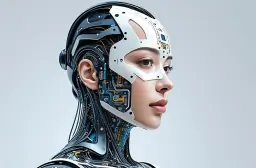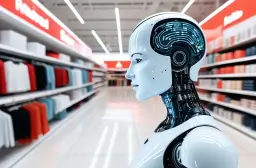How AI in Everyday Life is Transforming Our Daily Routines

Table of Contents
Let’s take a moment and imagine a single day—from your morning coffee to your evening workout. What if we told you that AI was a silent partner through it all? AI in Everyday Life isn’t just about robots or futuristic gadgets—it’s about the subtle, intelligent tools that streamline our routines, enhance our choices, and free up time for what truly matters.
We’re living in an era where artificial intelligence in modern living isn’t just a luxury; it’s becoming a necessity. So, how exactly is this shift unfolding? And more importantly, what does it mean for the future of our lifestyle, work, and personal productivity? Let’s dive in.
The Rise of Smart Assistants in Home Life
From Alexa to Google Home, smart speakers and AI assistants in home life have become as common as toasters and coffee makers. These devices are powered by advanced natural language processing and machine learning, enabling them to respond to voice commands, automate routines, and even learn user preferences over time.
Key capabilities include:
- Managing schedules and setting reminders
- Controlling lighting, temperature, and appliances
- Playing music or providing news and weather updates
These systems form the core of intelligent automation in households, making day-to-day life more convenient and efficient. Over time, they learn when to dim the lights for bedtime or suggest recipes based on your past preferences.
Case Study: According to a 2024 Statista report, over 300 million smart assistants are in use across U.S. households, reflecting a 25% growth year-over-year.
AI-Powered Daily Solutions for Personal Productivity

Whether we’re managing our calendars or responding to emails, AI tools for daily efficiency are making our work smarter, not harder. Tools like Grammarly, Otter.ai, and Notion AI help streamline communication, summarize meetings, and even organize thoughts for maximum productivity.
Examples of AI applications in everyday tasks include:
- Email filtering and auto-replies
- Smart scheduling assistants like x.ai
- Automated to-do lists and habit tracking apps
By incorporating machine learning in personal use, these platforms learn from user behavior to offer intelligent suggestions and better time management.
Stat Insight: A survey by McKinsey found that 44% of professionals using AI productivity tools experienced a 30% boost in task completion speed.
Intelligent Systems in Common Scenarios: Navigation and Travel
AI-enhanced living is never more evident than in how we travel. GPS apps like Waze and Google Maps employ AI-driven traffic prediction and real-time route optimization. These systems analyze millions of data points—from user inputs to traffic cameras—to determine the best path.
Robust travel features include:
- Predictive ETA updates
- Hazard and construction alerts
- Alternate route planning during congestion
These AI applications in everyday tasks reduce stress and improve punctuality, especially in busy urban settings.
Real-World Example: Uber and Lyft rely heavily on neural networks in common applications for dynamic pricing, driver allocation, and route optimization.
AI-Driven Convenience in Health and Wellness
From wearable fitness trackers to virtual nutrition coaches, AI is transforming how we maintain health. Smartwatches powered by deep learning in practical use analyze heart rate variability, sleep patterns, and physical activity to give tailored health insights.
AI-driven convenience in wellness includes:
- Monitoring daily steps and activity goals
- Suggesting exercises based on performance
- Detecting early signs of health anomalies
Moreover, AI integration in routine activities extends to mental health with apps like Woebot and Replika providing cognitive-behavioral support via chat.
Data Snapshot: Fitbit’s AI-enhanced devices have helped over 29 million users worldwide make informed wellness choices daily.
Cognitive Computing in Lifestyle and Entertainment

Streaming services like Netflix, Spotify, and YouTube exemplify how artificial intelligence in modern living can tailor content. Their recommendation engines use deep learning algorithms to analyze user history, likes, and even pause behavior to serve up just-right suggestions.
Enhancing lifestyle with AI involves:
- Personalized music and show recommendations
- AI-curated reading or news digests
- Smart home entertainment systems that adapt over time
The ability of AI to understand nuanced human behavior has created an entertainment ecosystem where everything feels designed just for us.
Insight: Netflix reports that 80% of viewing choices stem from its AI-based recommendation engine.
Automation in Everyday Experiences: Grocery, Shopping & Payments
Gone are the days of writing shopping lists. With smart refrigerators and AI-powered shopping assistants, we’re seeing AI in daily routines revolutionize how we consume. Amazon Dash, Instacart AI, and even Walmart’s predictive stock replenishment use intelligent automation to forecast and fulfill consumer needs.
AI applications in commerce include:
- Auto-restocking household items
- Personalized product suggestions
- Seamless checkout with facial recognition or QR codes
Stat to Know: 63% of Gen Z shoppers prefer retailers using AI for convenience and personalization, according to a Deloitte 2023 retail study.
Robotics in Daily Chores: A Helping Hand at Home
Vacuuming, mowing, and even window-cleaning have found a futuristic friend in robotics. AI-powered devices like Roomba or Landroid use AI for personal productivity to not just operate but optimize based on room layout, usage patterns, and cleanliness levels.
Popular use cases:
- Robotic vacuum cleaners with mapping and zoning
- Smart washers/dryers that auto-adjust cycles
- AI dishwashers that detect grime levels for efficient cleaning
These intelligent systems in common scenarios alleviate physical burden and create more time for leisure or family interaction.
Security and Safety Reinvented with AI Tools
Smart surveillance cameras, facial recognition locks, and AI motion detectors bring safety to the forefront. AI-powered daily solutions monitor, learn, and adapt to household habits to distinguish between usual and unusual behavior.
Examples include:
- Ring and Nest systems detecting package theft
- AI doorbells recognizing familiar faces
- Real-time alerts and cloud-stored footage
Insight: In a 2024 home security survey, 78% of respondents felt safer using AI-enabled devices compared to traditional systems.
FAQs: Understanding AI in Our Everyday Lives
How does AI affect our daily routines?
AI automates repetitive tasks, enhances decision-making, and delivers personalized experiences in home life, work, and entertainment.
Is AI replacing human interaction in daily activities?
Not entirely. AI complements human interaction by managing routine tasks, allowing us more time for meaningful connections.
Are smart home devices using AI safe?
Most reputable AI devices incorporate encryption and safety protocols, but users should ensure firmware updates and secure Wi-Fi connections.
Can AI help with mental health?
Yes, AI-driven apps provide support through chatbots, mood tracking, and CBT-based tools that improve emotional well-being.
What’s the future of AI in daily life?
AI will increasingly integrate with our environments—smart cities, autonomous transport, and predictive healthcare will all play a role.
Conclusion: Embracing the AI-Augmented Lifestyle
From cognitive computing in lifestyle to robotics in daily chores, AI in Everyday Life is no longer a futuristic ideal—it’s our present reality. It enhances our routines, automates our mundane tasks, and lets us focus on creativity, connection, and growth.
By understanding and embracing AI integration in routine activities, we become active participants in this transformation. The key is not to fear it but to learn, adapt, and harness AI for a smarter, more fulfilling daily experience.
Let’s welcome this intelligent transformation—one smart action at a time.
Popular Tags
ADS SPACE HERE


